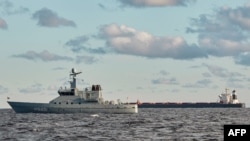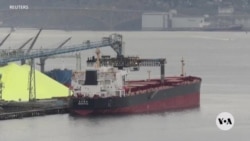European allies in the Baltic region are investigating how two fiber-optic data cables were severed earlier this week, with suspicion falling on a Chinese vessel in the area. Germany has said the incident was clearly sabotage.
The Danish navy said this week it is following the Yi Peng 3, a Chinese bulk carrier, as it moves through the Baltic Sea. As of Friday, marine tracking systems showed the vessel anchored east of the Danish city of Aarhus.
Denmark did not elaborate on why it was tracking the ship. However, there's widespread speculation the vessel may have been involved in the severing of two fiber-optic cables on the seabed, one connecting Finland and Germany and the other running between Sweden and Lithuania.
Speaking Tuesday, German Defense Minister Boris Pistorius was adamant it was no accident.
"I also don't like to believe in the version that these were anchors that accidentally caused — how shall I put it — damage to these cables. So, we have to conclude, without knowing exactly who did it, that it was a hybrid action. And we also have to assume, without knowing it, of course, that it is sabotage," Pistorius told reporters in Brussels.
European allies in the Baltic are collaborating on an investigation, according to defense analyst Charly Salonius-Pasternak of the Finnish Institute of International Affairs.
"There's the camp that I would say sees hybrid operations in absolutely everything. And it is one of the things I've cautioned against — that if you're in a hall of mirrors, everything looks a certain way. We don't know that," he told VOA.
"But as we've already seen in the Baltic Sea, but [also] elsewhere, the incidents of, as it were, 'perfect timing' in terms of anchors dragging or other things — at some point you have to start drawing conclusions that this cannot be just an accident," Salonius-Pasternak added.
Several similar incidents
There have been numerous similar incidents in the Baltic Sea in recent years. In October 2023, the Balticconnector gas pipeline linking Estonia and Finland was badly damaged.
Ten months later, China said a Hong Kong-registered vessel, the Newnew Polar Bear, had caused the damage accidentally in a storm. Finland remains skeptical of the admission, saying there were no storms in the area on the day the damage was detected.
"At least for some countries, it may be politically convenient to label them as kind of unsolved mysteries," Salonius-Pasternak told VOA. "Because if you identify them — saying, in this case, definitely someone in the Chinese political establishment directed the captain to do this — what are you going to do then?"
Questioned Thursday on Denmark's tracking of the Yi Peng 3 in the Baltic, Chinese foreign ministry spokesperson Li Jiang denied any knowledge.
"I do not have specific information on the Chinese vessel," Li said. "We are willing to maintain communication with the parties concerned in accordance with international law and jointly safeguard the safety of international seabed infrastructure. At the same time, we also hope that the normal navigational rights and legitimate interests of Chinese vessels will be effectively protected."
Baltic needs better monitoring, says leader
Speaking on Friday, Estonian Prime Minister Kristen Michal said better monitoring of maritime traffic was required in the Baltic.
"What are the surveillance systems and systems acknowledging what is happening and where? Who is moving where? And, where is the fault located?" Michal asked. "Because there can be also quite natural reasons."
In 2022, the Nord Stream pipeline carrying gas from Russia to Germany under the Baltic Sea was blown up. The perpetrator is still unknown. Western nations and Russia blame each other, while others have suggested that Ukraine carried out the attack. All deny responsibility.






